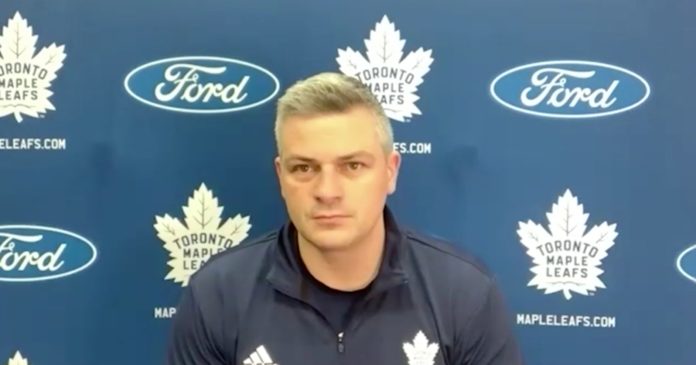
After practice on Friday, Sheldon Keefe discussed Auston Matthews’ growth in the leadership department, the decision to start Petr Mrazek on Saturday in Detroit, Ondrej Kase’s fit next to Matthews, Timothy Liljegren’s injury status, and the new line combinations.
Practice Lines – January 28
Lines at Leafs practice
Bunting – Matthews – Kase
Mikheyev – Tavares – Marner
Kerfoot – Kampf – Nylander
Engvall – Spezza – Simmonds
Ritchie, Clifford@TSN_Edge pic.twitter.com/qkQHw0HTXL— Mark Masters (@markhmasters) January 28, 2022
Can you update the status of Timothy Liljegren and Jake Muzzin?
Keefe: Liljegren looks like he is going to be okay. He got through practice well. He is reporting no signs of any symptoms. As of right now, we have him scheduled to play tomorrow. Like with any injury such as this, you are going to monitor it over time. We will see how he is before game time tomorrow.
Muzzin has continued to progress. He was out there again today going through a good portion of our practice. Both he and the medical team are not comfortable with where he is at right now to put him into games. He will not make the trip to Detroit.
Who will start the game in net tomorrow night, and what went into the decision?
Keefe: Mrazek will get the start tomorrow. Really, all that has gone into it is just what we have talked about. Similar to him playing in the Long Island game, we are going to need Petr a lot coming up. For the New Jersey back-to-back that is coming early next week, we know we need Petr.
We just thought getting him this game better prepares him for that versus having an even longer stretch in between games. We think trying to get him into a little bit of a rhythm is important.
Jack obviously goes right back in on Monday, and it is not too big of a game for him that way. We just like the way that it sets up for Petr.
Jason Spezza has spoken about Auston Matthews really rising in the dressing room as a leader, taking people aside for one-on-ones, and having a really good pulse on the team. Can you comment on that and what you have seen from him as a leader on and off the ice?
Keefe: I think he has been a leader through his actions and his performance really since he has been on the team and came into the league. With his natural ability, he gets the attention of everybody. Everybody follows him in that way.
As he has gotten older here, we have seen him stepping up vocally, whether it is talking to the team on the bench, talking in the dressing room, or just pulling guys aside and communicating with them, whether it is encouragement, correction, or strategizing. He has taken a lot more initiative that way.
We have talked about that at different times — the evolution in his leadership as he has gotten older here — but certainly, he has taken on a lot of it himself knowing that it is a big part of being a great player: leading the way, making others better, setting the standard, and having a level of accountability that goes with the leadership.
I think he has done a tremendous job in that way. It has been a natural step for him — one that would’ve been coming, for sure. I think he has been prepared for it and has done a good job with it.
With Matthews’ leadership, is there a situation in a game this season or a moment with another player that has stood out to you?
Keefe: There is not necessarily one particular play or game that stands out. In general, you hear a lot more chatter from him and his linemates. You see him on the ice before shifts and before faceoffs grabbing guys and taking charge more at different times. Not a lot of the coaches’ rooms are within earshot of the dressing room on the road and such — and at home, they’re not — but there are times when you can hear his voice in there.
You just hear more from him. I think he had been a very quiet player once he comes back to the bench in the past. We have seen him progress in that area. He is just taking on that increased leadership role. I think he recognizes where he is at within our team, where he is at in the league, and what he wants our team to accomplish. He has taken charge of it.
What was Matthews’ reaction when you talked about breaking up the lines? Is he the type of player where, because of his talent and leadership, it is not going to faze him?
Keefe: He was good with it. He shrugged it off as no big deal. Obviously, he has played with Kase before and had great success playing with him in the time that he has. I think he really likes playing with him that way. He and Bunting have been together for a long time.
I explained to all of the players my purpose behind it. It is an attempt to see what it looks like for us as a team — to see if it has the potential to make us a better team in the process. One way or another, I feel like we will come out of it as a better team. We will either have something else that works for us, or we’ll have the answers on something that maybe doesn’t work.
Each time I have come to Auston with something like that and let him know what I am thinking, he has been fully on board. He just goes out, plays, and competes no matter who he is playing with. That is what he did the other night. That is what I love to see.
Is there something about Ondrej Kase’s game that allows him to fit nicely around Matthews and Bunting?
Keefe: His legs don’t stop moving. He is on the puck. He pressures the puck. He puts the opponent in bad spots where they give the puck back to us. He is defensively responsible, and when the puck comes to him, he plays a play on it. He can finish.
He has a great skill set that allows him to be able to play anywhere in our lineup. He doesn’t change his game. We looked at his shifts the other night and a lot of little subtle things that he is doing lead to our team getting the puck back. When our team gets the puck back with him on the ice with Auston Matthews, that is a really good thing.
We got lots of benefits from that the other night. The puck didn’t go in for us at five on five, but we had lots of really good looks, a lot of time in the offensive zone, and Auston was touching the puck a lot. Those are the kinds of things I am looking for to make sure we are continuing to flow our offense and our guys are getting the touches that really need them.
That happened a lot the other night and it has in each of the other games that Kase has played with Auston. It is another thing that Kase has done in terms of opening up options for us because of his versatility.
Have you seen an improvement in the team’s ability to play through physicality, or are you expecting to see more of that coming at you in the second half when teams are gearing up for playoffs?
Keefe: No question, I expect it to be coming at us more. In the second half of the season, playoff races are going to heat up. Teams are going to be hitting their strides in the second half gearing up for playoffs. We expect that to come.
We have seen it. The other night in Long Island, we talked about it a little bit after the game. It was a very physical game. Their guys who are physical come at you. They did that. That was a game where I was really impressed with our group. Coming off of the Rangers game, we knew how we wanted to respond.
We are not always necessarily going to be the aggressors physically, but that, to me is not really what it is about. Can you play through the physicality? Does the physicality stop you from being who you are and using the skills that you have, or do you play through it?
Especially with our young defensemen in Sandin and Liljegren, they were playing big minutes again for us in that Long Island game, and physically, they were being punished on the forecheck on our breakouts. They relaxed, made plays, and knew that contact was coming. It didn’t take away from their ability to make the play, keep the puck moving, and keep us moving up ice. Those are little examples that stood out to me.
Throughout the season, you look at guys that we have on our team whose feet just don’t stop. If you get in Auston Matthews’ way these days, he is not stopping. He is driving right through you, he is going to keep his feet moving, and he is going to push you off the puck. That is just a great sign. We talked about his leadership, and that is an area where has really done that.
I look throughout our lineup, and whether it is returning guys or guys we brought in… Bunting, Kase — they’re guys whose feet don’t stop, and if people get in their way, they don’t stop. They keep competing. Those are all really good signs for us. That is the kind of competitiveness we are looking for.
I think that is really important — we can be ourselves and do the things that we do when things get hard.
It was just one game, but what was your sense of the Nylander and Kampf connection? What did you see from that duo in their first game together?
Keefe: I thought they were okay. They had one really good sequence in the second period and a really great scoring chance with Kampf out front. That really stood out to me. They only ended up playing about 7.5 minutes of even-strength time together as a group with power plays and how we moved things around. I don’t think we can take a whole lot out of it.
We are going to give it more time. In doing all of this with moving the lines around in the way that I did, it was with the intention that the line was not always going to be intact. We were going to be moving some people around. We are going to be on the road in Detroit, so we might do a little bit less of that without being able to control the matchups with last change. When we can, we may look to do it.
I thought that line did a good job. Obviously, with Kerfoot and Nylander, I really their chemistry and how they play off of one another. That doesn’t concern me much at all. Kampf being with them — he has played with Kerfoot, but not with Nylander. That is going to take a little bit of time there.
I think Kampf is an easy guy to play with in that you can trust and rely on him defensively. He is going to do a good job of helping you get out of your end and get you on offense. We are going to continue to look at it, but the early signs were encouraging.
Any time you change lines, you tend to focus on one or two things, but there are a lot of things happening and a lot of dynamics in how the lines are set up. It is more than just focusing on that line. It is also about how the other lines worked. With the way the Matthews and Tavares lines were set up, I thought both groups did a really good job.


![Sheldon Keefe Post Game, Leafs 3 vs. Bruins 2: “I loved [the Matthews] line, and I loved a lot about our game all the way through the lineup” Sheldon Keefe, Toronto Maple Leafs post game](https://mapleleafshotstove.com/wp-content/uploads/2024/04/keefe-pg-game-1-218x150.jpg)


![Jim Montgomery on adjustments for Game 2 vs. the Maple Leafs: “We need to spend more time in the offensive zone… We didn’t do a good job offensively at five-on-five [in Game 1]” Jim Montgomery, Boston Bruins practice](https://mapleleafshotstove.com/wp-content/uploads/2024/04/jim-montgomery-bruins-218x150.jpg)




















![Sheldon Keefe Post Game, Leafs 3 vs. Bruins 2: “I loved [the Matthews] line, and I loved a lot about our game all the way through the lineup” Sheldon Keefe, Toronto Maple Leafs post game](https://mapleleafshotstove.com/wp-content/uploads/2024/04/keefe-pg-game-1-100x70.jpg)




![Jim Montgomery on adjustments for Game 2 vs. the Maple Leafs: “We need to spend more time in the offensive zone… We didn’t do a good job offensively at five-on-five [in Game 1]” Jim Montgomery, Boston Bruins practice](https://mapleleafshotstove.com/wp-content/uploads/2024/04/jim-montgomery-bruins-100x70.jpg)


